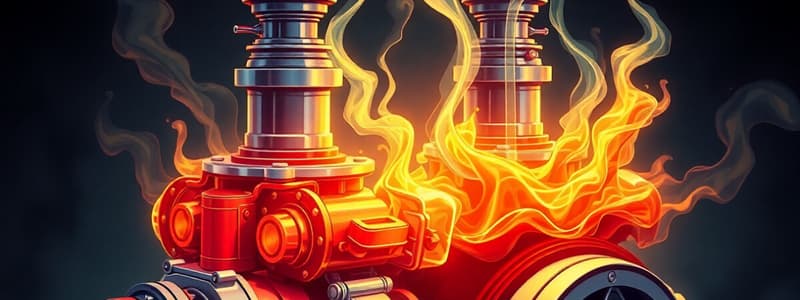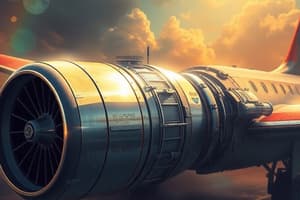Podcast
Questions and Answers
What is a consequence of an improper engine mixture?
What is a consequence of an improper engine mixture?
- Enhanced engine longevity
- Increased fuel efficiency
- Reduced power output (correct)
- Increased combustion temperature
How do carburettors assist in engine operation?
How do carburettors assist in engine operation?
- They regulate the flow of fuel and air (correct)
- They increase engine pressure
- They cool the engine block
- They lubricate moving parts
What is a key characteristic that affects coolant performance?
What is a key characteristic that affects coolant performance?
- Boiling point and viscosity (correct)
- Color of the coolant
- The shape of the coolant reservoir
- Presence of additives only
What is the primary function of lubrication systems in an engine?
What is the primary function of lubrication systems in an engine?
Which type of engine completes its power cycle in four strokes?
Which type of engine completes its power cycle in four strokes?
What role does a venturi play in a carburettor?
What role does a venturi play in a carburettor?
Which method is associated with liquid cooling systems?
Which method is associated with liquid cooling systems?
What is a common method of delivering lubricant in lubrication systems?
What is a common method of delivering lubricant in lubrication systems?
Flashcards
What is a piston engine?
What is a piston engine?
A type of internal combustion engine that uses pistons to convert pressure into mechanical energy, powering various mechanisms.
What is engine mixture?
What is engine mixture?
The mixture of fuel and air that powers an internal combustion engine.
What is a carburetor?
What is a carburetor?
A device that mixes air and fuel in the correct proportion before it enters a gasoline engine.
What is a cooling system?
What is a cooling system?
Signup and view all the flashcards
What is a lubrication system?
What is a lubrication system?
Signup and view all the flashcards
What is a four-stroke engine?
What is a four-stroke engine?
Signup and view all the flashcards
What is a two-stroke engine?
What is a two-stroke engine?
Signup and view all the flashcards
What is mixture ratio?
What is mixture ratio?
Signup and view all the flashcards
Study Notes
Piston Engine
- A piston engine uses pistons to convert pressure into mechanical energy, rotating a crankshaft for power.
- Four-stroke engines complete the power cycle in four piston strokes: intake, compression, combustion, and exhaust.
- Two-stroke engines complete a power cycle in two piston strokes.
- Different designs exist, differing in efficiency and construction.
Engine Mixture
- The engine mixture, a blend of fuel (gasoline or diesel) and air, is crucial for efficient engine function.
- The correct fuel-to-air ratio is vital for proper combustion and performance.
- Incorrect proportions can lead to inefficient combustion, reduced power, and potential engine damage.
Carburettors
- Carburettors meter the air-fuel mixture for internal combustion engines, mainly gasoline.
- They mix fuel and air before entry to engine cylinders.
- A venturi creates a vacuum to draw fuel into the airflow.
- Components like jets and float chambers control fuel and air flow.
- Carburettors are less common now.
Cooling Systems
- Cooling systems prevent engine overheating, vital for component longevity.
- Overheating damages internal engine components and shortens lifespan.
- Liquid cooling uses a coolant circulating through the engine block, transferring heat to a radiator.
- Air cooling uses fins and exposed surfaces to dissipate heat directly, which requires adequate airflow.
- Coolant properties, such as boiling point and viscosity, are critical.
Lubrication Systems
- Engine lubrication protects engine parts from wear.
- A lubricant film reduces friction between moving components like pistons and cylinders, lowering wear.
- Methods include oil delivery under pressure or splash lubrication.
- Regular lubrication checks and maintenance are crucial for optimal engine performance and lifespan.
Icing
- Icing on aircraft components, such as wings, impairs performance significantly.
- Icing forms from water vapor condensing at low temperatures.
- Icing severity varies and causes aerodynamic issues, reducing lift and control.
- Removing ice build-up (often through de-icing procedures) is necessary for safe flight.
- Preventing ice formation is crucial for maintaining flight safety.
Studying That Suits You
Use AI to generate personalized quizzes and flashcards to suit your learning preferences.




